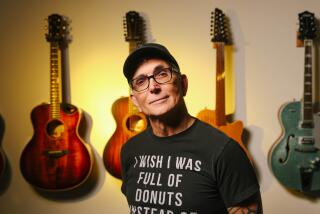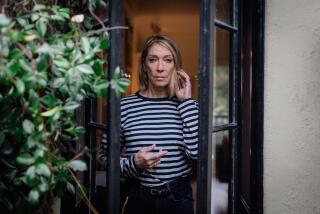PJ Harvey’s ‘The Wheel’ continues her fiery social commentary; DJDS dig deep; Woo gently mesmerizes
PJ Harvey, “The Wheel” (Island/Universal). The first song from Polly Jean Harvey’s forthcoming new album, “The Hope Six Demolition Project,” rolls with a garage punk momentum while documenting “a tableau of the missing.” Though unnamed, Harvey quantifies the vanished in sing-song rhyme with sordid detail: “Now you see them, now you don’t/ Children vanish ‘hind vehicle/ Now you see them, now you don’t/ Faces, limbs, a bouncing skull.”
This is Harvey’s first new material since her breathtaking 2011 album, “Let England Shake,” and it further reveals an artist focused on the politics of the disappeared. That album burned with lyrical blood and fire as she and her band indicted the war machine that fuels man-made catastrophes.

“The Wheel” suggests a thematic continuation, even if the creative process was different. Made in 2015 at London’s Somerset House during an exhibition called “Recording in Progress,” “The Hope Six Demolition Project” was recorded in a “purpose-built” studio. During what Harvey described as a residency, she and her band did all the tracking as public audiences watched from behind one-way glass. That immediacy permeates “The Wheel” and reads as a portent. The album comes out April 15.
DJDS, “Stand Up and Speak” (Body High/Loma Vista). The buoyant house music duo DJDS builds dance floor anthems four bars at a time, stacking thump-heavy beats, snares and high-hats until ears pop. The pair started as DJ Dodger Stadium but shortened their moniker for obvious legal reasons. Like their former namesake, though, DJDS is firmly planted in Los Angeles.

Across the 10 tracks on “Stand Up and Speak,” the team of Jerome LOL and Samo Sound Boy revel in complicated emotions. Unlike your typical house track espousing the benefits of peace, love, unity and/or respect, DJDS tracks examine emptiness, solitude and heartbreak. “In the Flames” is centered on a jagged sampled female voice singing about pain, confusion and insecurity: “Will you be there when I need you?” Each time the anonymous vocalist on “I Don’t Love You” repeats the title phrase to a former lover, she pounds a new nail. The result is another thrilling celebration of Los Angeles body music.
Woo, “Awaawaa” (Palto Flats). Recorded by brothers Clive and Mark Ives in South London between 1975 and ‘82, the “new” Woo album is as curiously strange as their other records. Like their mercurial 1989 release “It’s Cosy Inside” (reissued by Yoga Records in 2012), “Awaawaa” is rich with handcrafted instrumentals that combine electronic and acoustic sounds. Most are soothing melodic miniatures that clock in at under three minutes, but within these seemingly simple compositions reside impressive kingdoms. “Simpti” conveys a mountain of melancholia in just under two minutes. “Wobbly” works through a complex synthetic melody with a comfortable ease.

“Sometimes one and one made three, and we were in creative heaven,” Clive Ives wrote in a 2012 interview with Bomb Magazine. “From there the mind enters into the equation, and starts to envisage endless sounds upon sounds, combining musical influences and making them into something new, working with these wonderful gizmos to construct and shape sounds.” That “something new” may be decades old, but none of “Awaawaa’s” 16 songs feels dated. Rather, they ring with permanence.
Twitter: @liledit
MORE:
33 1/3 essential reissues and archival recordings of 2015
10 best pop music albums in 2015 include works by Earl Sweatshirt, Jlin, Natalie Prass
More to Read
The biggest entertainment stories
Get our big stories about Hollywood, film, television, music, arts, culture and more right in your inbox as soon as they publish.
You may occasionally receive promotional content from the Los Angeles Times.







